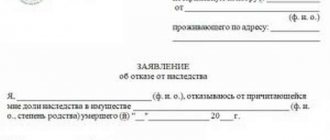What is a communal apartment
The Housing Code establishes the sequence of satisfying the demands of citizens living within a communal apartment regarding the improvement of their living conditions if living quarters in the apartment are vacant. The law, in order to protect and support citizens from socially disadvantaged groups, gives this category of persons an advantage in matters of providing free living space in a “communal apartment”. Let's consider the process of transferring vacant premises of a communal apartment to citizens, the features and nuances of this process.
The term “communal apartment” means a premises intended for living and divided into separate living quarters (rooms) in which citizens live. The premises of a communal apartment can belong either to the municipal housing stock, in which case people live in them under social tenancy agreements, or be owned by the residents. Usually, families who are not related to each other live in communal apartments. The persons living in it use the common property of a communal apartment on an equal basis, bear obligations in relation to the property and have rights to this property.
Communal apartment: how to add a room
Muscovites who are visited by nostalgic feelings for the Soviet invention called “communal apartment” most likely have not lived in it for a long time and have already forgotten about communal life. Those who are still faced with all its “charms” dream of the keys to a separate apartment. And when a room in a communal apartment becomes available, there is a chance to bring your lifelong dream closer. Join for free or buy? How? Who has the priority right to this? Answers to these questions in today's issue of SB. Letters of the law
Rights to vacated residential premises are described in the following laws and regulations: – Housing Code of the Russian Federation (Article 59);
– Moscow Law “Fundamentals of Housing Policy of the City of Moscow” dated March 11, 1998 No. 6 (as amended on February 16, 2005); – Moscow Law No. 22 of January 15, 2003 “On improving the living conditions of Moscow residents”; – Regulations on the procedure and conditions for the sale of vacant premises in municipal apartments owned by the city (approved by Decree of the Moscow Government of August 27, 2002 No. 706-PP). Considered
vacant Rooms are considered vacant if: – the tenant who previously lived in this room is provided with another room;
– the employer went to live elsewhere; – the tenant has lost the right to this residential premises; – the tenant has died, the tenancy agreement has been terminated. Then the executive authorities decide who will get the vacated rooms. Who is the arbiter of destinies?
After the territorial department of the Department of Housing Policy and Housing Fund of Moscow received information about the vacancy of a room in a communal apartment, it is obliged to notify the apartment residents in writing about this within a month with a proposal to annex or buy it out. Citizens who receive the “message” are required to report their intentions in writing within a month. If a family is entitled to vacated living space and agrees to occupy it, the possibility of adding rooms is considered by the public housing commission under the prefect of the administrative district. After the district housing commission has made a positive decision on the addition of a room or several rooms in a “communal apartment,” an order from the prefect is issued. An extract from it is given to the future tenant. A social rental agreement is concluded with him. And with this agreement - to your DEZ.
ACCESSION
For those who have little money and square meters
Who has the right to occupy vacant residential premises?
According to the Housing Code of the Russian Federation (Article 59), vacated premises in a communal apartment are provided under a social tenancy agreement to the tenants or owners living there on the basis of their application, if they: 1. At the time of vacating the premises, they are recognized or can be recognized as low-income and in need of housing premises. Attention! Those who registered as those in need of improved housing conditions before March 1, 2005 do not have to be recognized as low-income; they retain their right to receive social rented housing. In this case, for joining a room. What does it mean to be recognized as needy? This means that in fact, people occupy living space less than the registration norm (in a communal apartment - 15 sq. m), but for some reason they did not get in line to improve their living conditions. They may be allowed to annex the vacant room. 2. If there are no “first-priority” applicants for a neighbor’s vacated room in a communal apartment, it will be given to tenants or owners who are not in line for housing, but may be recognized as low-income, and besides, they have less than the norm for providing total space per person (18 sq. meters). As for “low income”, as long as everything remains the same, such a certificate is not required. Although the law “On the procedure for recognizing Moscow residents as low-income for the purpose of registering them as needy” (it came into force on February 26, 2006) was adopted, the matter has not yet come to practice. The right to additional space
An empty room can also legally go to beneficiaries - long-term residents of communal apartments, people with serious illnesses.
According to the current city law No. 22 “On improving the living conditions of residents of the city of Moscow,” long-term residents of communal apartments are put on a waiting list without taking into account the standards for the occupied living space. Currently, long-livers of communal apartments are recognized as Muscovites who have lived in the capital for a total of at least 40 years and have lived in a communal apartment: 1) for the last 10 years, with a full total work experience; 2) the last 5 years, if there is a disability of the 1st and 2nd groups. For now, the “extra” square meters may also go to family members of communal long-livers living with them (in the absence of separate apartments). Currently, the bill “On the rights of Moscow residents to improve housing conditions,” which is being considered by the City Duma, proposes to recognize only those living alone as long-livers in communal apartments. Sick people suffering from severe forms of certain chronic diseases have the right to additional living space, regardless of the registration norm, if they have a medical certificate. In this case, all available living space under the right of use or ownership is taken into account. The list of such diseases is given in the following documents: – Decree of the Government of the Russian Federation No. 817 of December 21, 2004 “On approval of the list of diseases giving disabled people suffering from them the right to additional living space”; – Circulars of the NKVD of the RSFSR dated January 13, 1928 No. 27 and the People's Commissariat of Health of the RSFSR dated January 19, 1928 No. 15 “List of diseases that give the right to persons suffering from them to use an additional room or additional living space.” Documents for joining
To draw up a social tenancy agreement for a vacant living space in a communal apartment, you will need the following documents: – a unified housing document;
– copies of passports, birth certificates (for minor family members); – housing documents from the place of residence of the spouse or minor children, if they are registered at a different address; – if available, preferential documents giving the right to additional space. Maybe the applicants for the neighbor’s room have some other property on their property; documents for that will also be required. If
there are more than two, let’s say two or more families are applying for the vacant room, and everyone has the right to get it. Then the controversial case is brought up for discussion by the district housing commission. This takes into account: – the year of registration: whoever stood in line longer gets the green light; – the size of the rooms they occupy, how many square meters per family member; – date of registration on the occupied area; - family composition. And other circumstances - health status, age, room layout.
RANSOM
All the same - according to the norms
If among the residents living in a communal apartment there are no low-income people or those on a waiting list for improved housing conditions, as well as those who are recognized as low-income and have a total living space of one family member less than the social norm, the vacated housing is provided under a sales contract (Article 59, Part 3 Housing Code of the Russian Federation).
That is, you can add an empty room by purchasing it. But also provided that the living space standards allow this. As before, the housing complex, in the event of a room being vacated in a communal apartment, was like this: you live on an area of less than 18 square meters. m per person - please add a room. If the “brother” accounted for more than 18 sq. m, the possibility of redemption was provided. Now there are restrictions: if the living space norm is exceeded, even a ransom is not allowed. This is the procedure.
The procedure and conditions for the sale of vacant rooms in communal apartments owned by Moscow are described in the Regulations on the procedure and conditions for the sale of vacant premises in communal apartments owned by the city (approved by Decree of the Moscow Government of August 27, 2002 No. 706-PP) .
In particular, only Muscovites who are permanently registered and live in these apartments under social rental agreements, or who own housing, can buy empty housing. A necessary condition for selling a room to a tenant is his consent to privatize the purchase. As soon as the Department of Housing Policy in the administrative districts receives information about the vacancy of a room (rooms) in a communal apartment, residents of the communal apartment living on social rent or owning living space in this apartment are notified about this. Those, in turn, are obliged to give an answer about their intentions within a month - either to buy out or refuse. Documents for redemption:
Those wishing to buy it provide the following documents to the district administration: – application for the purchase of vacant residential premises;
– a single housing document; – explication and floor plan for the apartment; – calculation of the sale price of residential premises made by BTI. A certain period of time is allotted for collecting documents: a month from the date of receipt of the notification. If for any reason it is missed, you will have to document its respect. And then, by decision of the management, it can be extended. Next, a package of documents from applicants for the purchase of a room is submitted to the City Commission for Privatization and Housing Management. If the commission makes a positive decision, the Department of Housing Policy and Housing Fund of Moscow concludes a purchase and sale agreement with the buyer. The basis for concluding an agreement is a certificate of permission to purchase vacant residential premises, which is issued by the district administration of the Moscow Housing Policy Department. The agreement is subject to state registration. Three prices
The sale price of vacated living space in a communal apartment is calculated by GorBTI in accordance with the Methodology approved by the order of the Mayor of Moscow dated June 24, 1996 No. 15/1-RM “On approval of the Methodology for calculating the sale price of housing sold to individuals and legal entities by decisions of the Moscow government” . The sale price of vacant residential premises is approved on a case-by-case basis by the City Commission for Privatization and Housing Management using one of three options for calculating the cost of vacant rooms: 1. Cost taking into account the rise in price of construction products. 2. Technical characteristics of the house and apartment. 3. Taking into account the location of the house. The calculations take into account the year the house was built, its physical wear and tear, the material from which the walls were built, the floor, the presence of an elevator, a garbage chute and other parameters. Of course, the area in which it is located is of great importance (it is clear that inside the Boulevard Ring it will cost more). There are certain formulas and coefficients that are used in calculations. The result is three values. And then the City Commission decides at which price to sell the municipal real estate. The approach is purely individual. What is taken into account is mainly the ability to pay for a vacant room and social status. Those who have lived in communal apartments for a long time have advantages. It is checked whether they have benefits and whether they own any other real estate. If so, they are more likely to rate the room using the first, cheaper option.
BY THE WAY
Last year, reader of our newspaper T. bought a vacant room in a three-room communal apartment. For 20.3 sq. meter, he paid a little more than 200 thousand rubles, and the housing commission, of the three cost rates presented according to the BTI assessment, determined the highest for him: one square meter of housing cost him 10 thousand rubles. It is not difficult to calculate how much cheaper this is than the market price. The three-story post-war house is located in the green quarter of the Pokrovskoye-Streshnevo district, where today a meter of housing costs at least two thousand dollars. And in the “green” rooms the room cost T. about $7,800. Feel the difference!
Missing
A fairly typical situation: one of the rooms in a communal apartment is empty. Her owner hasn't shown his nose for years. And in general it is unknown where he is, what he is, whether he is alive. Residents of communal apartments are not averse to occupying empty living space, but how? You can connect a room in a communal apartment only if it is legally vacant. The police can find your missing neighbor. But only relatives have the right to apply for a search. If the police do not establish the location of the deceased neighbor, this fact is confirmed by a certificate. This will be the basis for the housing department to apply to the court to declare the wanted person missing. Only after the court makes such a decision is the invisible neighbor removed from the registration register, and his living space is considered vacant.
ON A NOTE
If everyone has refused to buy the vacant living space, and no one has any reason to join it for free, other tenants from the “outside” can be moved into the room under a social tenancy agreement. That is, the apartment was communal and remains so. * * * If there are several applicants for a vacant living space, it can be sold with the consent of all tenants or owners of rooms in a communal apartment into shared ownership. Controversial issues between applicants for ransom are considered by the court.
Prepared by Galina Pisarchik with the assistance of specialists from the Office of the Department of Housing Policy and Housing Fund in the Northern District
Transfer of living space in a communal apartment to low-income and needy citizens
In order to implement social government policy, it is the poor and needy people who have the primary right to receive free space in a “communal apartment” under a social tenancy agreement. The issues of recognizing citizens as low-income and in need of housing under a rental agreement are considered in detail by the Russian Housing Code (see Articles 51 and 49).
It is important to comply with one condition: these citizens must live in the apartment at the time the room is vacated. If such citizens move into the apartment after the room has been vacated, they will not be able to claim their rights to the room.
If the above-mentioned citizens are not in the apartment, the room is provided to persons who are low-income and have documents confirming this status in their hands, under a rental agreement, if the total area of the living space used by them is less than the norm established by law for the residence of citizens. If, according to their financial situation, citizens are low-income, but have a housing area in an apartment that is larger than the accounting norm for their region, they will be able to claim their rights regarding the room under a rental agreement only in the absence of citizens recognized as low-income and in need of housing.
Selling a room in a communal apartment - LAWYER CONSULTATIONS
As for the common property in a communal apartment, it includes a gas stove, cabinets, bedside tables, and doors. Shared furniture is not difficult to share, and in most cases there are no conflicts.
Please give an answer to the question on what basis the 15+15 housing program ceased to operate in the Main Missile and Artillery Directorate of the RF Ministry of Defense.
All residents have an equal right to use the corridor, kitchen, bathroom, toilet, hallway. By default, it is considered that residents can occupy the area of the specified premises with furniture and other property according to their share in the apartment.
General procedure for settling a spare room in a communal apartment
The housing law provides for stepwise settlement, in other words, categories of citizens have the right to move in in accordance with the “steps”, the location of which is determined by the social status of the person. Premises are provided first to certain categories of citizens living in an apartment in which a room has become available. And if such citizens do not live in the apartment, or do not declare their rights and renounce them, the premises can be transferred to citizens who do not live in the apartment, on the grounds established by law.
If the above categories of citizens do not live in the apartment, other citizens can receive the premises on the basis of a purchase and sale agreement if the total area of the residential premises used by them is less than the norm established by law for residence. Persons at this level are also subject to the rule of mandatory residence in the apartment until the room is vacated.
In accordance with the last “stage” of provision, the vacated room can be received by persons in need of housing and not belonging to the above categories of citizens, if the listed persons are absent from the apartment or waive their rights. Such cases occur quite often; citizens refuse to claim rights to a room, hoping to receive more comfortable living conditions. To obtain a vacant room, citizens are required to submit a properly completed application to the authorized bodies. If the decision of the authorized bodies does not satisfy citizens applying for vacant housing, disagreements can be resolved in court.
Pre-emptive right to purchase
Such eviction can be subject to both the tenant and all members of his family, as well as individual citizens who use the residential premises for other purposes, systematically violate the rights and legitimate interests of neighbors, or mismanage the residential premises, allowing them to be destroyed.
When selling a share in a communal apartment, the new owner acquires the right to use common areas, and the previous owner loses them.
If a tenant lives on the basis of a social tenancy agreement, then his rights are limited. In this situation, the owner of the premises will be the municipality, and any decision regarding a specific room will first have to find support from authorized officials.
Russian legislation provides for the priority right to occupy a vacant room in a communal apartment by tenants or owners of other rooms in the same apartment. Unless, of course, we are talking about vacating a non-privatized room. The procedure for providing vacated rooms in communal apartments is determined by Article 59 of the Housing Code of the Russian Federation.
In the second place (if there are no persons from the first place), the vacated room will also be provided for social rent to tenants or owners living in the corresponding apartment, if they can be recognized as low-income and if they are provided with a living area per family member that is less than the provision rate.
The statement of claim indicated that L. Erofeeva is in a registered marriage with M. Erofeev and is registered in a 3-room apartment with an area of 40 sq.m., where her husband and his parents live.
The procedure for inheritance and accounting of such property, considered escheat, is determined by law. Currently, Art. 225 of the Civil Code “Ownerless things”, in connection with which the question remains open: does the state inherit exactly things (following the example of England, USA, France) or acquires both assets and liabilities, i.e. debts of the testator (modeled on Germany, Switzerland, Japan)?
However, in fact, all our relations with others are regulated by the civil code, and in relation to neighbors - also by the housing code. This allows you to find justice for bad neighbors and even evict them.
It is very difficult to force adults to observe, in fact, the only rule of living in a communal apartment: you need to respect each other, if possible, not disturb your neighbors and abide by the agreements reached. Remember that it is much more difficult to refuse a polite request than a demand made in a raised voice.
The daughter remained to live in the same area in isolated rooms of 20 and 15 sq.m. in a 3-room communal apartment, although she was included in the order and signed an obligation to vacate the previously occupied living space.
The main point of disagreement is the different ideas of communal apartment residents about the rules of cohabitation.
V. Margolina, who has been on the register of those in need of improved housing conditions since 1989, contacted the district department for registration and distribution of living space and asked the inspector to explain what rights she has to receive living space and how this process can be accelerated.
The court refused to satisfy the Gavrilovs' claims. They filed a cassation appeal to the city court.
By decision of the district administration, the apartment was classified as a service apartment until it was provided by the Queen. After five years of work, the Queen was dismissed of her own free will (a certificate was provided from the medical institution that, due to the nature of the disease, the Queen could not perform the work of a janitor in the winter).
During the consideration of the case, the plaintiffs changed their claims and agreed to Telegin exchange the room he occupied.
The right to use residential premises may be terminated on the grounds provided for by the Housing Code of the Russian Federation, other federal laws, for example the Civil Code of the Russian Federation, an agreement or a court decision. If a citizen does not voluntarily stop using the residential premises, then its owner has the right to file a lawsuit to evict the citizen, in this case the owners are living together.
Termination of legal relations under a social tenancy agreement
A social tenancy agreement provides for the provision of residential premises to persons, which by law are classified as premises of a state or municipal fund. Such housing is provided to citizens in need for permanent residence.
The validity of the social tenancy agreement is not limited to a specific period; citizens can live in the premises provided to them for any amount of time, subject to compliance with the requirements that the law establishes as mandatory for residents of houses, apartments and rooms.
A social tenancy agreement can be terminated by agreement of the parties at any time. If a citizen has moved to another place of residence, the agreement with him is terminated from the day the premises are vacated. The Housing Code provides for the termination of a social tenancy agreement in connection with the death of the tenant, who was a single person, and in connection with the destruction of the premises.
A situation where no one lives in a room and the location of its occupants is unknown does not provide grounds for other persons to move into this empty room. It is legislatively established that the temporary absence of citizens from residential premises does not constitute a change in their rights and obligations regarding housing. Consequently, the premises cannot be considered vacant, since citizens occupied under a social tenancy agreement have rights to it, even if they are absent for a long time.
Judicial termination of a social tenancy agreement
The law also provides for termination of the contract in court. This requires clear grounds, and the law clearly indicates them. The contract is terminated in court in the following cases:
- Using the premises for purposes that are not provided for by law for this type of premises. In other words, if a citizen uses a room or apartment not for living, but to carry out any activity on the premises for which permission has not been obtained, or this activity contradicts the purpose of the premises. A social tenancy agreement with such a citizen can be terminated in court.
- If a resident citizen systematically commits actions that disturb the quiet living of his neighbors and other citizens, for example, makes noise at night, keeps his premises and common areas in an unsanitary condition, which creates a threat to the health of other persons, etc.
- If a citizen refuses to pay utility bills for a long time.
- If the resident citizen himself, or other persons for whom the citizen is responsible, committed such actions in relation to the premises that led to irreversible negative changes or destruction.







